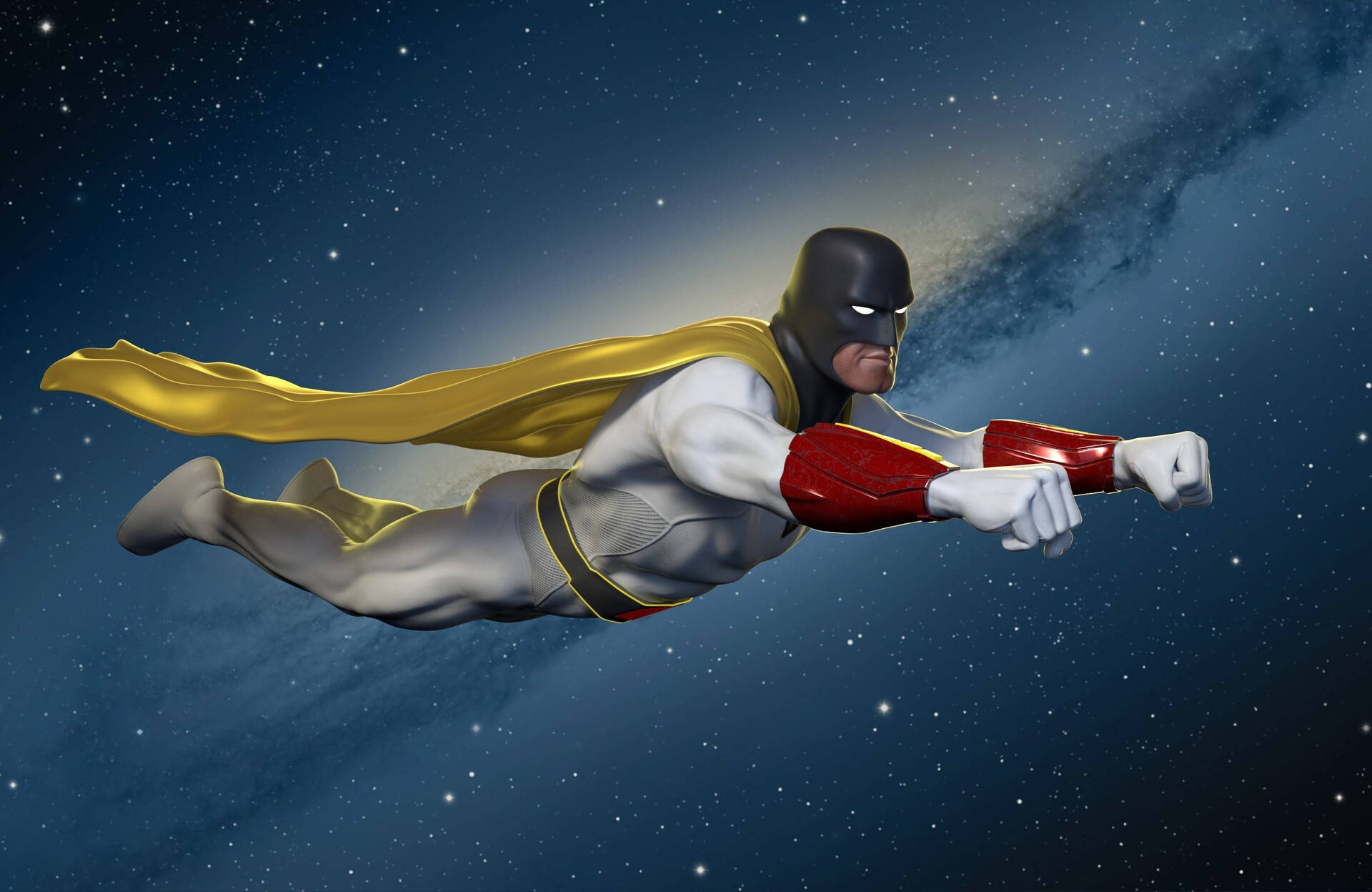By Andrew J. Hewitt, APRN-BC
Abstract
Space Ghost—a classic superhero from Hanna-Barbera’s 1960s animated series, later reimagined in offbeat Adult Swim programming and modern comics—offers a rich case study in identity conflict, role adaptation, and existential dissonance. This blog explores the psychological dimensions behind his evolution—from galactic crime-fighter to surreal talk-show host—through DSM-5 constructs such as identity disturbance, adaptation stressors, and possible mood regulation themes. It illustrates how media characters reflect and inform psychological themes and clinical conversations.
Introduction
Space Ghost, originally introduced in 1966, is an interstellar crime-fighter endowed with flight, invisibility, beam powers, and time-warping technology—typically battling villains with sidekicks Jan, Jace, and Blip the monkey (Wikipedia, 2025) Wikipedia. His reinvention in the 1990s as the satirical host of Space Ghost Coast to Coast parodies late-night talk shows with absurdist humor and surreal dialogue, marking a radical identity shift for the character doctor-multiverse.comWikipedia.
In recent years, comic revivals have depicted a grittier and more emotionally complex Space Ghost, reminiscent of a pulp vigilante rather than a cartoon hero Graphic PolicyBut Why Tho?. For the mental health provider, Space Ghost’s fluctuating identities, performative roles, and legacy across media offer fertile ground for exploring themes of role confusion, adaptation, and psychological resilience.
Identity Disturbance and Role Fluidity
From a DSM-5 perspective, Identity Disturbance typically refers to a markedly and persistently unstable self-image or sense of self (APA, 2013). Although Space Ghost doesn’t experience pathological instability, his transition across formats—hero, host, gritty avenger—reflects professional and identity shifts that could parallel real-world challenges of role change.
- Original Hero Identity: In his launch series, he embodies the stable archetype of a noble superhero with clear purpose and allies Wikipedia.
- Talk Show Persona: In Coast to Coast, he’s recast as a melodramatic TV host—egotistical, awkward, and absurd—underscoring performance strain and existential mismatch between role and self WikipediaMedium.
- Modern Comic Reboot: The new comic portrays him as a darker, enigmatic force, “whispered about in cosmic myths” and more fallible—suggesting mood fluctuations, existential burden, or moral ambiguity Graphic PolicyReddit.
Clinically, such transitions can be akin to identity flexibility or identity confusion during major life shifts—e.g., career change, evolving social roles, or burnout. The discourse might include: “What does publicity versus purpose feel like? How does one reconcile heroism with satire?”
Adaptive vs. Maladaptive Role Transitions
Space Ghost Coast to Coast embodies maladaptive adaptation: the hero shifts into a performative, ego-driven host, encountering resentment and conflict with former villains turned subordinates, such as Zorak and Moltar Everything Explained TodayMedium. This role inversion may reflect internal struggles with aging relevance or impostor identity—phenomena common in professional burnout and aging populations.
Adaptively, though, the comic reboot reclaims the hero’s essence with complexity: operating in a morally ambiguous cosmos, confronting corruption, and exhibiting vulnerability Graphic PolicyBut Why Tho?. This shift mirrors post-traumatic growth models, where adversity leads to deeper identity integration rather than retreat.
Existential Strain and Legacy Burden
Space Ghost is often portrayed as a solitary figure burdened by cosmic responsibility—responsible for intergalactic peace, yet isolated. Existential distress, meaning questioning, and ethical burden align with DSM-5 discussions on depressive and adjustment disorders.
When recontextualized as a talk-show host surrounded by surreal comedy, the emotional dissonance becomes amplified—he performs heroism in front of a desk, with absurd guests, masking existential angst behind humor. Clinically, this mirrors escapism, role conflict, and avoidance of deeper grief or trauma.
Grief, Performance, and Disruption
While canonical lore is sparse on origin trauma, the 2024 comic’s darker tone suggests underlying loss, threat, and vulnerability—evident in ominous cosmic crime themes and faltering heroism Graphic PolicyReddit. A PMHNP-BC could conceptualize this as unprocessed grief or moral injury: perhaps former comrades died, or personal failure lingers—a theme echoed in Jace’s guilt over killing Zorak (Dark themes, issue #6) AIPT.
Media as Reflective and Therapeutic Mirror
Using Space Ghost as a case study offers a narrative therapy opportunity—especially for clients navigating identity shifts or midlife reevaluation. Clients might identify with:
- A disillusioned hero trying to find meaning in daily performance (host persona),
- A hero facing threats to personal integrity in a morally grey world (comic reboot),
- A longing for coherence across fragmented roles.
DSM-based formulating might involve exploring role distress, grief, identity dissonance, and transitional stress, applied to a fictional frame that clients may find less threatening to discuss.
Community Impact and Emotional Resonance
Space Ghost has resonated across generations, inspiring fans through both nostalgia and reinvention. Reddit eulogies express deep emotional connection and comfort drawn from his voice and shows—indicating his role in shaping viewers’ emotional landscapes Reddit+1. This suggests that media characters can hold therapeutic value as emotional anchors.
—
Conclusion
Space Ghost exemplifies a multifaceted case of identity evolution—from heroism to satire to vulnerable avenger. Through a DSM-5-informed lens, he models identity disruption, existential strain, grief underperformance, and resilience. For mental health providers, fictional character analysis can act as scaffolding for clients to explore their own role transitions, grief, and self-concept. In advancing media-based therapeutic techniques, Space Ghost offers a dramatic yet relatable mirror to human psychological experience.
References
American Psychiatric Association. (2013). Diagnostic and statistical manual of mental disorders (5th ed.).
Graphic Policy. (2024, May 1). Space Ghost #1 delivers a grittier start for the classic character. [Review]. Graphic Policy
Wikipedia. (2025). Space Ghost. Wikipedia
Wikipedia. (2025). Space Ghost Coast to Coast. Wikipedia
Ristola, J. (2025). “Every Time I Move My Arm …”: Remixing limited animation in Space Ghost: Coast to Coast. Television & New Media. SAGE Journals
Consequence of Sound. (2024, April 15). How Space Ghost Coast to Coast changed Cartoon Network forever. Consequence
But Why Tho?. (2024, April 30). ADVANCED REVIEW: ‘Space Ghost’ Issue #1. But Why Tho?
Redditor on Dynamite comics. (2024, November 1). Discussion: Space Ghost gritty reboot. Reddit
Graphic Policy (2024) in Space Ghost #6 review: Jace’s trauma. AIPT
Redditor eulogies: Space Ghost impact. Reddit+1
This narrative integrates a PMHNP-BC interpretation with pop culture analysis to engage with psychological themes via a beloved media icon.

